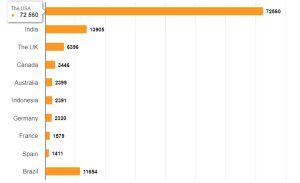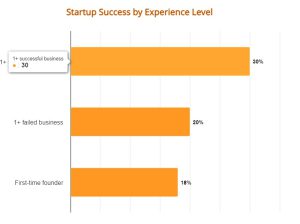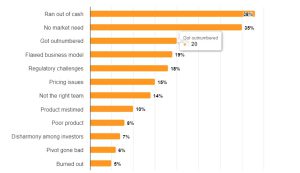Startups are the driving force behind innovation and economic growth. Understanding startup statistics provides valuable insights for entrepreneurs, investors, and policymakers. By analyzing these numbers, we can identify trends, challenges, and opportunities in the startup ecosystem.
Startup Statistics: Global Startup Landscape:
- US Dominance: The United States leads the world in startup activity, followed by China and the United Kingdom.
- Industry Focus: Software and data-driven startups are dominant, followed by digital health.
- Innovation Hubs: San Francisco Bay Area, New York, London, Los Angeles, and Boston are renowned startup hubs.
Entrepreneurial Trends:
- Average Age: The average age of startup founders is 42.
- Experience Matters: Entrepreneurs with at least three years of work experience have a higher chance of success.
- Success Stories: Jeff Bezos, Steve Jobs, and Bill Gates achieved significant milestones later in their careers.
Challenges and Opportunities:
- Inflation Impact: Rising inflation rates can negatively affect startup valuations and funding.
- Crowdfunding Growth: Public investment through crowdfunding continues to increase.
- High Failure Rate: Nearly 90% of startups fail, primarily due to inadequate funding, market misalignment, and talent acquisition challenges.
- Market Growth: The overall market value of startups has grown significantly in recent years.

The Future of Tech: A Statistical Overview
The tech world is experiencing rapid growth and innovation across various sectors. Here’s a look at some key trends and statistics:
Market Growth:
- SaaS: The Software as a Service (SaaS) market is projected to grow from $130 billion in 2021 to $716 billion by 2028.
- Fintech: The financial technology (Fintech) industry is expected to reach a value of approximately $700 billion by 2030.
- AI: The artificial intelligence (AI) market will surpass $1.5 trillion by 2030.
- Metaverse: The Metaverse market is estimated to reach $800 billion in 2024 and $1.6 trillion by 2030.
- Biotechnology: The biotechnology market is expected to reach $3.8 trillion by the end of 2023.
Workforce Trends:
- Remote Work: 93% of tech companies are expanding their remote work policies.
- HR Tech: The global HR software market is projected to grow by more than 100% by 2028.
- Skills Gap: While 98% of companies acknowledge a significant skills shortage, only 40% implement targeted learning and upskilling programs.
Social Responsibility:
- ESG: Increasingly, startups are considering environmental, social, and governance (ESG) factors in their business decisions.
Startup Exits:
- M&A: In the first half of 2022, mergers and acquisitions accounted for 2,502 exits, compared to 156 public offerings.
Startup Success:
- Flexibility: 93% of successful businesses have pivoted from their original idea, demonstrating the importance of adaptability.
- Funding Challenges: About 60% of companies fail to secure Series A funding, limiting success rates to 30-40%.
- Maturity: Reaching the maturity stage significantly increases the chances of success, with a failure rate of only 1%.
- Industry Variation: Success rates vary across industries, with e-commerce startups facing higher failure rates than gaming.
Global Startup Trends:
- High Failure Rates: In the first year, over 70% of startups fail in countries like the US, Canada, France, England, Germany, Switzerland, and Estonia.
- Overcoming Hurdles: Success often hinges on overcoming initial challenges.
- Industry Opportunities: Sectors like robotics and advanced manufacturing offer promising growth potential.
- Series D: Reaching Series D funding doesn’t guarantee success, as only 10% of companies at this stage achieve significant milestones.
- Resilience: Despite the high failure rate, a significant portion of small businesses with startup experience continue to operate beyond their first year.

Europe: A Land of Entrepreneurial Opportunities
While starting a business in Europe can be challenging, with a 50% failure rate within the first three years, it’s important to note that experienced entrepreneurs have a higher chance of success.
The Role of Experience:
- Serial Entrepreneurs: Those who have started multiple businesses have a success rate of 36.9%, compared to 25.3% for first-time entrepreneurs.
- Venture Capital Support: Experienced entrepreneurs are more likely to attract venture capital funding.
Beyond Experience: Keys to Success
- Perseverance: Resilience and determination are essential qualities for startup founders.
- Creative Thinking: Innovative problem-solving can help overcome challenges.
- Luck: While not solely reliant on luck, a certain degree of favorable circumstances can contribute to success.
Understanding Startup Failure:
- High Failure Rate: Nearly 90% of startups fail, and only 1% reach a valuation of $1 billion or more.
- US Statistics: In the United States, the failure rate is similar, with 20.8% failing in the first year, rising to 48.4% by the fifth and 65.1% by the tenth.
Despite the challenges, Europe offers a supportive environment for entrepreneurs, with numerous resources and opportunities available.
Key Failure Factors:
- Financial Resources: Lack of funding is a primary reason for failure (38%).
- Market Misalignment: Not understanding the market needs (35%).
- Competition: Intense competition (20%).
Experience Matters:
- Higher Success Rate: Experienced entrepreneurs have a 20% higher chance of success.
- Learning from Failure: Novice entrepreneurs can learn from their mistakes and improve their chances in future ventures.
First-Year Failure Rates by State and Industry
Understanding first-year failure rates can help entrepreneurs make informed decisions.
- California: Despite the national trend, California has the lowest first-year failure rate at 13.2%.
- Other States: Washington and Nevada have relatively low rates at 16.7% and 18.5%, respectively.
- Industry Challenges: The information, professional services, and office services industries face higher first-year failure rates, indicating competitive landscapes.
Empowering Entrepreneurs
By analyzing these statistics, entrepreneurs can make informed decisions, such as choosing a location with a supportive ecosystem or focusing on industries with lower failure rates. However, success ultimately depends on factors like a strong business plan, a passionate team, and adaptability.

Startup Failure: A Closer Look
The startup world is filled with both promise and pitfalls. Understanding common reasons for startup failure can help entrepreneurs avoid common mistakes and increase their chances of success.
Key Reasons for Startup Failure:
- Market Mismatch: If a startup’s product or service doesn’t meet real market needs, it’s likely to fail.
- Financial Constraints: Lack of adequate funding is a significant obstacle.
- Weak Team Formation: Choosing the wrong team members can hinder execution and lead to failure.
- Ineffective Competition: A lack of understanding of competitors and competitive strategies can be detrimental.
- Wrong Pricing Strategy: Setting an incorrect price can lead to customer loss.
- Ignoring User Needs: Neglecting customer needs and expectations can hinder success.
- Poor Monetization: A lack of a clear and effective business model for generating revenue can be fatal.
- Poor Marketing: Inadequate marketing plans and low brand awareness can limit visibility.
- Ignoring Customer Feedback: Ignoring customer feedback can lead to products or services that don’t align with market needs.
Failure as a Stepping Stone
While the high failure rate of startups can be discouraging, it’s important to remember that failure can often be a stepping stone to success. By learning from mistakes and persevering through challenges, entrepreneurs can increase their chances of building a successful business.


